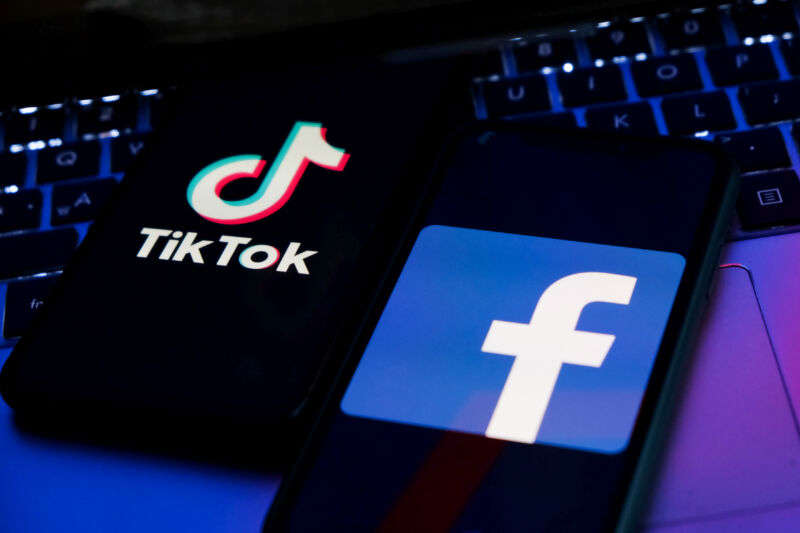
If you can’t beat ’em, smear ’em.
That appears to be Facebook’s approach when it comes to countering the threat from TikTok, according to a new report in The Washington Post. Meta, Facebook’s parent company, has hired Targeted Victory, a large Republican consulting firm, to place stories in op-eds in local newspapers and on local TV newscasts around the US, according to the report.
TikTok poses perhaps the most existential challenge to Meta and Facebook yet. The video-based social media platform has gained users at a swift pace, and it’s especially popular among younger users, a demographic that Facebook and Meta’s other platforms have struggled with in recent years.
In an earnings call in February, Meta CEO Mark Zuckerberg all but acknowledged that TikTok was to blame for the company’s recent headwinds. For the first time, Facebook lost around 1 million daily active users last quarter. “People have a lot of choices for how they want to spend their time, and apps like TikTok are growing very quickly,” Zuckerberg said. Facebook’s own research, revealed by whistleblower Frances Haugen, shows that teens were using TikTok two to three times more than Instagram.
Around that same time, a Targeted Victory director emailed campaign operatives, exhorting them to “get the message out that while Meta is the current punching bag, TikTok is the real threat, especially as a foreign-owned app that is #1 in sharing data that young teens are using.”
A staffer replied: “Bonus point if we can fit this into a broader message that the current bills/proposals aren’t where [state attorneys general] or members of Congress should be focused.”
The consulting firm also helped coordinate op-eds and letters to the editor that were placed in local and regional newspapers, including ones that were markedly similar that ran in The Denver Post and the Des Moines Register. The op-eds said that TikTok was harmful to children’s mental health and claimed that “many people even suspect China is deliberately collecting behavioral data on our kids.” In neither case did Targeted Victory disclose its involvement.
“We believe all platforms, including TikTok, should face a level of scrutiny consistent with their growing success,” Meta spokesperson Andy Stone told The Washington Post.
Targeted Victory pitches itself as being at “the intersection of politics and business,” saying that it brings a “right-of-center perspective to solve marketing challenges.” The company also says it “start[s] at the hyperlocal level” and creates campaigns that “scal[e] from the neighborhood level all the way to a complete national rollout.” Targeted Victory was founded in 2009 by Zac Moffatt, who ran digital operations for Mitt Romney’s 2012 presidential campaign.
The firm’s “hyperlocal” focus is apparent in the emails seen by the Post. Targeted Victory staffers “urged partners,” the Post said, to find stories that would link TikTok to ominous-sounding stories about teen behavior. “Any local examples of bad TikTok trends/stories in your markets?” a staffer asked. “Dream would be to get stories with headlines like ‘From dances to danger: how TikTok has become the most harmful social media space for kids.’”
Targeted Victory also attempted to pin blame for scary teen trends on TikTok, including the “devious licks” challenge, in which students can be seen vandalizing schools. Yet, that challenge reportedly originated on Facebook, not TikTok, according to an investigation by the podcast Reply All.
Meta’s apparent smear campaign against TikTok likely comes from the fact that Meta’s options for dealing with the new competitor are limited. It launched Reels, a copycat feature that it’s pushing heavily in Instagram, though it’s still too early to know whether the feature is stealing any significant attention from TikTok.
If Meta were facing a different competitor in an earlier era, it might have tried to buy the company out as it did with Instagram and WhatsApp. But the social media giant is now under increasing scrutiny of its behavior, making large deals harder to close. TikTok also poses a unique challenge in that it’s owned by a Chinese company, ByteDance. It’s highly unlikely that Chinese regulators would ever sign off on a merger or acquisition by an American company.
https://arstechnica.com/?p=1844747

